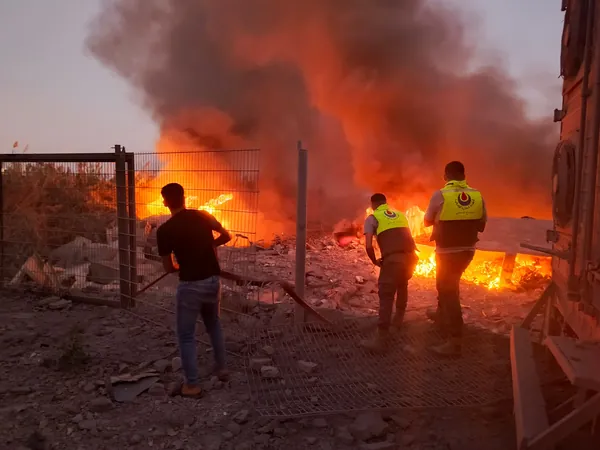
Biden's Policy Blunders: How US Actions Have Fueled Violence in Lebanon
2024-09-24
In a shocking turn of events that has left the world reeling, the Biden administration stands accused of inadvertently igniting a catastrophic escalation of violence in Lebanon, following a recent spate of Israeli attacks that have claimed the lives of nearly 500 individuals in just one day.
Just days before Israel's bombardment commenced on September 17, President Biden dispatched Amos Hochstein, his envoy, with the mission of urging a ceasefire and promoting de-escalation in a region embroiled in conflict. However, Israeli military provocations swiftly followed Hochstein's arrival, culminating in deadly strikes on Hezbollah positions and civilian areas across Lebanon.
Khaled Elgindy, an expert from the Middle East Institute, insisted that Israel has consistently ignored numerous warnings from Washington without facing repercussions. “The pattern is clear," said Elgindy. “Israel knows that they can act without restraint, essentially disregarding any diplomatic overtures from the Biden administration.”
The consequences of this disregard were devastating. With the bombing of buildings in southern Beirut that resulted in countless civilian casualties, including children, the Israeli military's actions have been characterized as a declaration of war against Lebanon. Humanitarian experts warn that this moment marks one of the darkest chapters in Lebanon's history, exposing the potential for a wider regional conflict.
As hostilities grew, the Biden administration maintained its unwavering military support for Israel, raising alarms about the intent behind such backing. Throughout the ongoing Gaza war, the situation has escalated, with reports indicating that over 41,400 Palestinians have lost their lives to date. The violence has also spilled over into Lebanon, where Hezbollah has intensively retaliated against Israeli military positions, asserting that their actions are a response to Israel’s aggression in Gaza.
Analysts argue that the Biden administration's apparent lack of serious engagement to enforce a ceasefire reflects a deeper agenda tied to domestic political considerations as the U.S. approaches its upcoming elections. Critics, including James Zogby from the Arab American Institute, describe the Biden government as a “passive enabler” of Israeli Prime Minister Benjamin Netanyahu, suggesting that its inaction serves political ends rather than genuine efforts for peace.
While White House officials, including Pentagon spokesperson Pat Ryder, insist that a broader regional war has not yet materialized, experts fear the explosive potential of the situation. “The U.S. is refusing to exert any real pressure on Israel, effectively chasing a narrative while the ground reality is dire,” said Elgindy.
The administration's failure to hold Israel accountable for its actions, particularly the targeting of civilian infrastructure and the casual disregard for lives in Lebanon, highlights an uncomfortable truth. Recent events illustrate that decisions made in Washington may have dire humanitarian consequences on the ground.
As the region continues to descend into chaos, skepticism surrounds the U.S.'s efforts to achieve a lasting peace. With growing tensions threatening a wider conflict across the Middle East, only time will reveal the full ramifications of Biden's foreign policy miscalculations. Will the administration change course, or will it continue down a path that could lead to further devastation? The answer may determine the future of the region.









 Brasil (PT)
Brasil (PT)
 Canada (EN)
Canada (EN)
 Chile (ES)
Chile (ES)
 España (ES)
España (ES)
 France (FR)
France (FR)
 Hong Kong (EN)
Hong Kong (EN)
 Italia (IT)
Italia (IT)
 日本 (JA)
日本 (JA)
 Magyarország (HU)
Magyarország (HU)
 Norge (NO)
Norge (NO)
 Polska (PL)
Polska (PL)
 Schweiz (DE)
Schweiz (DE)
 Singapore (EN)
Singapore (EN)
 Sverige (SV)
Sverige (SV)
 Suomi (FI)
Suomi (FI)
 Türkiye (TR)
Türkiye (TR)